Naomi Klein’s Case for a Green New Deal
Air Date: Week of September 20, 2019
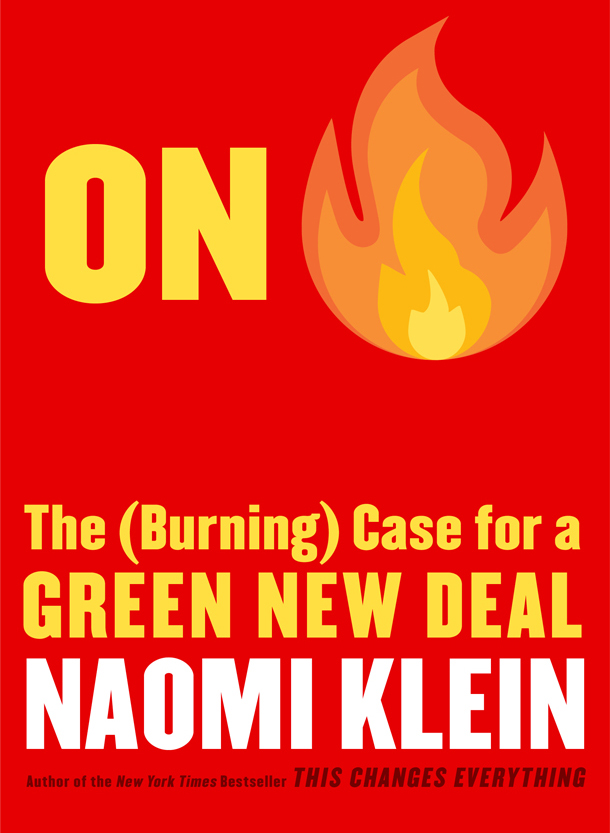
On Fire: The (Burning) Case for a Green New Deal gathers some of Naomi Klein’s essays written over the past decade, as well as new writing. (Image: courtesy of Simon & Schuster)
The warming world is on fire – but so is the movement that’s calling for action, writes journalist and activist Naomi Klein. In her book On Fire: The (Burning) Case for a Green New Deal, she lays out a case for why the climate crisis presents an opportunity to address economic inequality, racism, misogyny, and other societal problems. Naomi Klein tells Host Steve Curwood climate disruption can no longer be addressed with just singular policies as only radical systemic change will work.
Transcript
CURWOOD: It’s Living on Earth, I’m Steve Curwood.
We’ve been here before, and we’re here now. Esteemed scientists sound alarms of impending warming disasters. Climate activists take to the streets. Politicians talk about climate disruption and offer policies to address it. And in 2015, world leaders even came together to sign an historic pact to curb emissions. Yet climate-warming emissions have surged to record levels. And the world continues to warm. So some say nothing short of systemic change will snap us out of this failed loop and a sustainability reboot of the economic system could also remedy the problems of racism, misogyny, and economic inequality. In her book, On Fire: The (Burning) Case for a Green New Deal, climate activist and writer Naomi Klein lays out why the climate crisis cannot be solved without complete change. She joins me now from New York. Naomi, welcome back to Living on Earth!
KLEIN: So great to be with you again, Steve.
CURWOOD: So how fair is it to say that your book makes the argument that we cannot succeed in addressing the climate emergency unless we do do something like a Green New Deal?
KLEIN: Well, that's the argument I make. And in fact, this is what we have heard from the leading climate scientists, most recently from the Intergovernmental Panel on Climate Change and the 1.5 report that came out a year ago, where they said that if we are going to stay below 1.5 degrees, which they strongly recommend that we do, then it will require unprecedented transformation in virtually every aspect of society. That is a quote from the summary of their report. So you know, we've, we've talked so much and done so little, when it comes to lowering emissions, that now the things that we must do in the face of accelerating climate destabilization are so profound, that we can't think of it in terms of a singular policy anymore. We really are talking about building the next economy, on a deadline.
CURWOOD: So what lessons could a Green New Deal take from FDR's New Deal?
KLEIN: Well, I think that we can take both inspiration and harrowing warnings from the original New Deal. So let's start with the warnings first. The original New Deal excluded many, many Americans. Many African American workers were excluded. Women workers were excluded; domestic workers; agricultural workers were excluded. The truth is, the most vulnerable, least protected workers in the workforce were sacrificed to get this thing through. There was also segregation, I mean, this was Jim Crow America. So you had the CCC camps, the Civilian Conservation camps. They were almost all male; there was one women's camp. Actually, Eleanor Roosevelt wanted women to be full participants in the CCC, but they only got one camp and they specialized in canning over there.
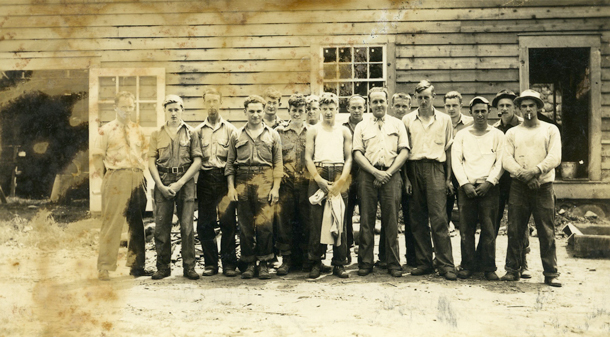
A Civilian Conservation Corps team takes a break from constructing park buildings, c. 1939. (Photo: Richard, Flickr CC BY 2.0)
CURWOOD: Well, that doesn't sound like very good news! What's the upside of FDR's New Deal?
KLEIN: Well, I foreground the warnings because I think they, they do tell us that if justice, if racial justice, gender justice, economic justice isn't at the center, and in front of mind, we have every reason to believe we would make the same sorts of political calculations. But here's why I don't think we just throw the whole thing out, okay? Because the New Deal reminds us that it is possible to do very big things, many of them really very exciting, like planting 2.3 billion trees, or having a artistic Renaissance, public funding for the arts. And those parts of the, of the New Deal actually were very forward-looking when it came to gender and race. They remind us that when we come together with boldness, we can change a whole lot. And I think that that is incredibly important because when you talk to people about climate change right now, climate change denial is receding. Climate change hopelessness, climate change doomsaying, a sense of inevitability, that there's nothing we can do -- that is rising. And I think it's rising because we have been told a story about the kinds of human beings we are, that we're incredibly short-sighted, that we're hyper-individualistic, we only just care about gratifying our, ourselves in the short term. And so if that's all we are, if we're not capable of coming together and seeing a big picture and working together, then we really are doomed. And the New Deal and also, you know, wartime transformations during the Second World War, where we saw the proliferation of Victory Gardens, where people changed, you know, the way they move themselves around, stopped using cars for leisure driving, started using public transit, and on and on. They remind us actually, that it is possible to change very quickly with the right kinds of political leadership. And when it is designed in a way that is perceived as just.
CURWOOD: Talk to me a little bit more about the arts that emerged during FDR's New Deal; you write at some length about that in your book.
KLEIN: Yeah, I, I do, because I think that part of the barrier that we're up against is really a barrier of the imagination, that after a certain point, when we've only seen one version, or variations on the same version of climate apocalypse, it starts to feel like a foregone conclusion. So I think we need to awaken the utopian imagination, the idea that actually we can be many things. And so, you know, I quote different sci-fi writers who talk about that utopian imagination, including Ursula Le Guin. And I write about the experience that I had, being part of a little film project with Representative Alexandra Ocasio-Cortez and the wonderful visual artist, Molly Crabapple, where we decided to make a short film that was titled "A Message From the Future With Alexandria Ocasio-Cortez." It's set an indeterminate number of years in the future, after we have already won a Green New Deal. And it paints a picture of this world transformed. And thanks to Molly's just incredible paintings, it's, you know, it's a very beautiful place. And you know, and it's not, it's not all good; we talk about the time that a hurricane wiped out large parts of Florida. But it talks about the change in values and how people came together and didn't turn on each other. So I think artists have a really important role to play in helping us imagine the future that we need and breaking through this sense of sort of apocalyptic inevitability. I also think we should recognize that art is low carbon, you know, there's lots of, you know, putting on a play can be low-carbon work; painting a mural with a bunch of kids in the neighborhood as, you know, there were so many thousands of them during the New Deal era, that's low-carbon work. You know, when we think about a green job, we often think about a guy in a hard hat, putting up a solar panel. And that is great, and we need lots of those jobs, and we need to make sure they're unionized jobs, and they pay workers a fair wage. But, you know, caring for kids is also low-carbon. Teaching kids is low-carbon. Caring for the sick is low-carbon. And like I said, making art is low-carbon. So part of what I'm writing about in the book is how we need to expand the care sectors, and other low-carbon sectors that really improve quality of life. Because people have gotten this idea in their heads that responding to climate change is all about loss, all about deprivation. And it is true that there are things that we are going to have to contract when it comes to wasteful forms of consumption. But there are also activities that are already low-carbon, do improve our quality of life more than anything else, like access to art in nature, having good schools for our kids, taking care of each other. And we can make them even more low-carbon if we do this right.
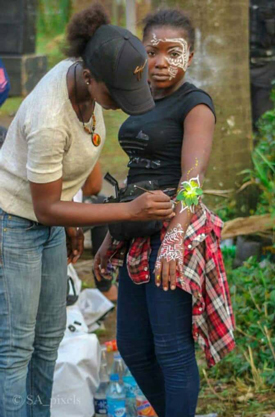
Making art can be low-carbon, Naomi Klein points out. A Green New Deal could support artists just like President Franklin Delano Roosevelt’s New Deal did in the 1930s. (Photo: Yufifalato722, Wikimedia Commons CC BY-SA 4.0)
CURWOOD: So FDR, his New Deal was top down; the World War II mobilization was very much top down. How do we actually implement a Green New Deal today, when our political structure's kind of wobbly from the top down?
KLEIN: Kind of. Yeah. [LAUGHS] Well, you know, I would say that, you know, it's certainly true that the World War II mobilizations were very top down. And there were parts of the New Deal that were very top down. But it's also true that the New Deal was a process, a push and pull from above and below, right? What we see in the periods when these programs, you know, they call it, you know, sort of the "alphabet soup" agencies of, you know, WPA and so on. When they were being rolled out, this was a period of intense work or mobilization in the United States. There was a huge spike in strikes in 1934, '35, '36, '37. So all throughout the period where FDR's administration is doing more and more, and quicker and quicker, they're facing a huge amount of pressure from organized working class people who are saying, "We need more, this isn't enough, what you're doing is only a start, we need more protections." So I think there's a very important lesson, that this can't be something that is just handed down from any political party. You know, I think this only happens on a federal level if there is a new administration in place in 2020. But we also don't have to wait. I mean, there's a huge amount, there are Green New Deal projects that are getting kicked off in large cities in the United States, in states like New York and California, and we need to be pushing for the states that can to do more. And then we also need, I think, to be ready to stay organized, no matter who is in the White House in 2020.
CURWOOD: Of course, the Green New Deal is criticized by some as a left-wing wish list, left wing revolution, really, to take away private property and turn America into some sort of socialist place. How do you respond?
KLEIN: Well, a couple of ways. One is that we have been trying over the past couple of decades to address the climate crisis, to address the crisis of soaring emissions, within the confines of a sort of market logic, right? So we have a cap and trade system in California; there are countries that have introduced carbon taxes. I'm originally from Canada, we have a carbon tax that many people look to as an example, in British Columbia. If you look at the territories that have done this, you see some marginal improvements over doing nothing. But what you don't see is anything like the emission reductions that scientists are telling us we need to do, right? I mean, British Columbia, this model carbon tax-- emissions have gone up in British Columbia almost every year except one that the carbon tax has been in place. And the year that they went down, it was because of the global recession, it wasn't because of the tax. I think there is an opening, a political opening, a willingness to talk about deeper change, which we see in the Democratic primaries, you know, in a willingness to talk about regulating corporations, and a willingness to talk about Medicare for All, and direct job creation. And so I think many of the climate solutions that, frankly, were obvious to many of us writing about this for years, but were treated as politically, sort of untouchable for many years. Now, there's just more political space to talk about the real solutions, because there is a sense that this whole system is kind of failing people on multiple fronts. So the Green New Deal is a holistic vision that connects the dots between economic insecurity, lousy jobs that don't pay a living wage, systemic injustices of all kinds and says, Okay, let's multitask here. Let's find a way to radically lower emissions in line with science in a way that is going to close all of these systemic inequalities.
CURWOOD: So UN Secretary General António Guterres has called leaders from government, business, civil society, everyone to come to the Climate Action Summit in New York, and to have nations put forward how they're going to ramp up their Paris Agreement emissions reductions commitments. How hopeful are you about what they'll be able to offer?
KLEIN: I think every national context is different. I think the young climate strikers are really putting a lot of pressure on their leaders to come to the table with more than nice words. You know, it's, it's significant that Greta Thunberg, who kicked off this wave of climate youth activism -- there's been young people involved in the climate movement from the get go, but there's definitely a new wave that began with her decision to go on strike from school, now there are these strikes every Friday. And it's significant that Greta comes from Sweden. You know, I mean, here in the US, we, we often invoke Sweden as a country with much better green policies than we do. But you know, Greta's saying, well, you talk a good game, but I'm looking at the emissions and it's nowhere in line with what you're saying needs to happen in terms of, you know, keeping our temperatures below 1.5 to 2 degrees Celsius. And so I think it'll be interesting to see the dynamic. I think these leaders know they're being watched by their own kids in a way that is actually quite new.
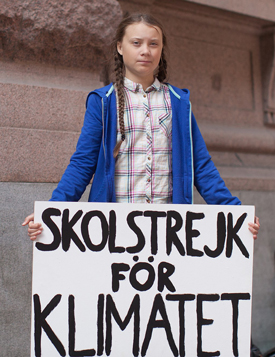
Sixteen-year-old Swedish activist Greta Thunberg ignited the Fridays for Future youth climate strike movement. (Photo: Anders Hellberg, Wikimedia Commons CC BY-SA 4.0)
CURWOOD: Naomi, if you look at the planet, about 80% of the planet's people are brown. And if you look at the emissions, the bulk of the emissions have come from the white part of the world. To what extent is the climate emergency a symptom of white supremacy?
KLEIN: Well, I think it absolutely is. I mean, even the fact that it has not been treated as a crisis is a reflection of the fact that the people in the teeth of the crisis already are overwhelmingly black and brown people. So it reflects a discounting of lives. Even setting the temperature target of two degrees Celsius, several years ago; when that happened, African delegates stormed out of the UN meetings and called it a genocide, because they said Africa can't survive that level of warming. So I think every way that we have responded or failed to respond to the climate crisis has reflected a discounting of black and brown lives, and continues to this day. And what really worries me is that I think the days of overt climate change denial are numbered. And I think we're starting to see people on the far right, who are openly racist, embrace an ideology that some are even calling eco-fascism, where they are simply saying, we are going to fortress our borders, we think our countries are going to be doing relatively better. And we are going to let the rest of the world... drown; die on the land. I mean, this is what the New Zealand killer, the Christchurch killer who killed more than 50 people in two mosques on March 15th, he identified as an ethno-nationalist, eco-fascist. And he opposed immigration in part on environmental grounds. So I guess what scares me right now is that I think the only thing that is more frightening than a resurgent racist right that denies climate change, is a resurgent racist right that doesn't deny climate change. And that uses this barbaric ideology that ranks the relative value of human life as the justification for fortressing majority white continents.
CURWOOD: And what's to be done about this?
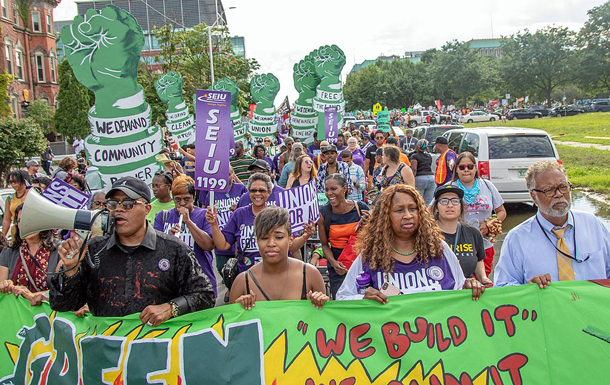
Activists marched to ask politicians to “Make Detroit the Engine of the Green New Deal!” on July 31, 2019. (Photo:Becker 1999, Wikimedia Commons CC BY 2.0)
KLEIN: Well, this is why I don't believe we can talk about climate change as just, you know, about being differing sets of policies. I think we are living the result of a worldview that has always been based on dominating people and nature. And that worldview has produced the climate crisis, and that we actually need not just new policies, but as Greta says, we need new ways of thinking that are not based on competition, dominance, hierarchy. And we can't be afraid to talk about the language of morality when it comes to climate change, the language of values.
CURWOOD: Naomi Klein, before you go, would you mind reading a passage from your book for us?
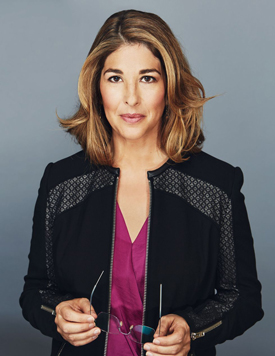
Naomi Klein (Photo: Kourosh Keshiri)
KLEIN: Oh, I'd love to, thank you. This is from the end of the, of the introduction. ‘
The message coming from the school strikes is that a great many young people are ready for this kind of deep change. They know all too well that the sixth mass extinction is not the only crisis they have inherited. They are also growing up in the rubble of market euphoria, in which the dreams of endlessly rising living standards have given way to rampant austerity and economic insecurity. And techno-utopianism, which imagined a frictionless future of limitless connection and community, has morphed into addiction to the algorithms of envy, relentless corporate surveillance, and spiraling online misogyny and white supremacy.
"When you have done your homework," Greta Thunberg says, "you realize that we need new politics. We need a new economics, where everything is based on our rapidly declining and extremely limited carbon budget. But that is not enough. We need a whole new way of thinking . . . We must stop competing with each other. We need to start cooperating and sharing the remaining resources of this planet in a fair way." (Unquote.)
Because our house is on fire, and this should come as no surprise. Built on false promises, discounted futures, and sacrificial people, it was rigged to blow from the start. It's too late to save all of our stuff, but we can still save each other and a great many other species, too. Let's put out the flames and build something different in its place. Something a little less ornate, but with room for all those who need shelter and care.
CURWOOD: Naomi Klein is a journalist, activist, and her new book is called On Fire: The (Burning) Case for a Green New Deal. Naomi, thanks so much for taking the time.
KLEIN: Thank you so much, it was a pleasure and a privilege.
Links
On Fire: The (Burning) Case for a Green New Deal by Naomi Klein
Watch: “A Message From the Future with Alexandria Ocasio-Cortez”
Living on Earth wants to hear from you!
Living on Earth
62 Calef Highway, Suite 212
Lee, NH 03861
Telephone: 617-287-4121
E-mail: comments@loe.org
Newsletter [Click here]
Donate to Living on Earth!
Living on Earth is an independent media program and relies entirely on contributions from listeners and institutions supporting public service. Please donate now to preserve an independent environmental voice.
NewsletterLiving on Earth offers a weekly delivery of the show's rundown to your mailbox. Sign up for our newsletter today!
 Sailors For The Sea: Be the change you want to sea.
Sailors For The Sea: Be the change you want to sea.
 The Grantham Foundation for the Protection of the Environment: Committed to protecting and improving the health of the global environment.
The Grantham Foundation for the Protection of the Environment: Committed to protecting and improving the health of the global environment.
 Contribute to Living on Earth and receive, as our gift to you, an archival print of one of Mark Seth Lender's extraordinary wildlife photographs. Follow the link to see Mark's current collection of photographs.
Contribute to Living on Earth and receive, as our gift to you, an archival print of one of Mark Seth Lender's extraordinary wildlife photographs. Follow the link to see Mark's current collection of photographs.
 Buy a signed copy of Mark Seth Lender's book Smeagull the Seagull & support Living on Earth
Buy a signed copy of Mark Seth Lender's book Smeagull the Seagull & support Living on Earth

